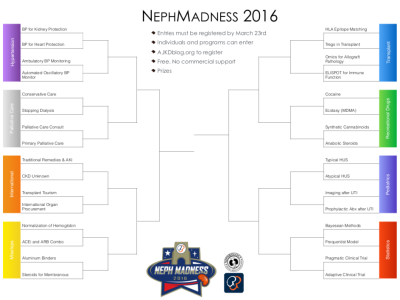Hospice and palliative medicine has been on my mind a lot recently. Of course, this is partly because it is a region in NephMadness but also because so much of the day to day work of a nephrologist deals with the end of life.
Last year I hosted a Hospice and Palliative Medicine chat. That chat focused on Tamura’s ground breaking study, Functional Status of Elderly Adults before and after Initiation of Dialysis. Take a look at the blog post introducing that chat:
Have you ever read a journal article and as soon as you finished the abstract you had this forbidding feeling that if the authors actually proved what they claimed to have discovered your medical life will never be the same?
This happened to me when I read, “Functional Status of Elderly Adults before and after Initiation of Dialysis (OPEN ACCESS)” by Tamura et al. in 2009.
In that post I wrote, “While this study did not track patients who deferred dialysis it is hard to imagine they could do much worse.” Well just last month, the other shoe dropped. We now have a well executed study that does look at the patients who deferred dialysis for conservative care:
In this study the entire cohort showed a survival advantage with dialysis care but on further subgroup analysis, patients over the age of 80 did not gain additional time on earth by choosing dialysis. In this case dialysis did not extend life.
Nephrologists need to start to train ourselves away from the reflex that dialysis is a way to extend life. In some easily identifiable patient groups it provides as much harm as benefit. And this is just counting days alive. If you compare the quality of those days, perhaps by looking at Tamura’s Functional status study, dialysis begins to look especially grim.
This makes me happy that Palliative care is a region in NephMadness. NephMadness is an online, social media-engaged, medical education project in its fourth year. It is an homage to the NCAA basketball tournament, March Madness. We replace the teams with a bracket full of 32 different nephrology concepts from 8 different academic regions.

Then we replace the games (which normally decide the winners) with a blue ribbon panel that votes on each contest and selects the teams that advance through the brackets.
Participants are invited to fill out their own brackets and see how well they match up against the Blue Ribbon Panel. There are prizes and bragging rights at stake. And no we aren’t nerds. Why do you ask?
Tonight’s chat is going to examine the 4 concepts in the Palliative care region, each for about 15 minutes. The four entries are:
- Conservative care
- Stopping Dialysis
- Palliative Care Consult
- Primary Palliative care
Take a look at the brackets,
fill out your own and then join us tonight to discuss the Palliative care region.














